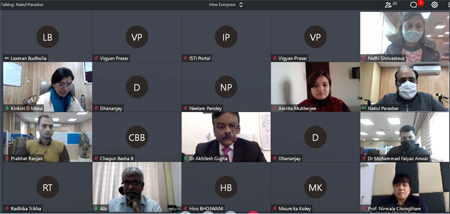 Experts highlighted how the wide consultation process and recommendations like support for higher education and strong linkage between industry and academia make the draft 5th Science Technology and Innovation Policy (STIP) a comprehensive one at the post-draft consultation with research scholars and young scientists.
Experts highlighted how the wide consultation process and recommendations like support for higher education and strong linkage between industry and academia make the draft 5th Science Technology and Innovation Policy (STIP) a comprehensive one at the post-draft consultation with research scholars and young scientists.
“A lot of efforts has gone into preparing this draft policy, and there has been wide consultations from larger sections of society to make it a comprehensive policy. A consultation process, which is still going on, would make it more refined. The policy is aimed at achieving technological self-reliance and position India among the top three scientific superpowers in the world in the decade to come and to build individual and institutional excellence in STI with the aspiration to achieve the highest level of global recognition,” said Dr. Akhilesh Gupta, Adviser DST, and Head STIP Secretariat at the consultation session organized through webinar.
Dr H R Bhojwani, former scientist CSIR, said that he has been part of previous three scientific policies, but none of them were such a comprehensive policy like this draft policy. “It is for the first time that such a wide consultation has been done from this variety of range of people. It is very comprehensive and addresses all the aspects. National Science Observatory, One nation one subscription, and open science are unique features of this policy, and this would create a precedence,” he pointed out.
Prof Nirmala Chongtham, Coordinator, DST-CPR, Punjab University, advocated for focus on strong linkage between industry and academia to gain prosperity and benefits of science, technology, and innovation and to reach out to common people of the country. “Enthusiasm for research is declining, and those coming for research are not actually coming for research only but for job or academic achievements. Research should not be only for academic achievement but for social impact also and should also address all social-economic strata. We have various products that are much better than products available in the market, but the irony is that very few know about them. Our policy should address all these issues,” she added.
Prof T A Abinandanan, Coordinator, DST-CPR, IISc, Bangalore, talked about support to higher education that is expected from the policy and concerns like finance, autonomy, and outreach”, he said.
Research scholars and scientists from a wide range of disciplines, including Dr. Nakul Parashar, Director, Vigyan Prasar, and Dr. Kinkini Dasgupta, scientist F, discussed the role of New Science, Technology and Innovation Policy in Promoting Research and Innovation in India at the consultation session organized by Vigyan Prasar, an autonomous organization of Department of Science & Technology (DST).
The draft STIP was put together by STIP Secretariat led by Dr. Akhilesh Gupta with guidance from the Office of Principal Scientific Adviser (PSA) to the Government of India (GoI) and DST, GoI. The draft STIP was released for public consultation on 31st December 2020. Since then, a number of post-draft consultations have already been initiated to invite suggestions and recommendations. A series of consultations have been planned during next 1 week. The last date for receiving the comments has been extended to 31st January 2021.






























